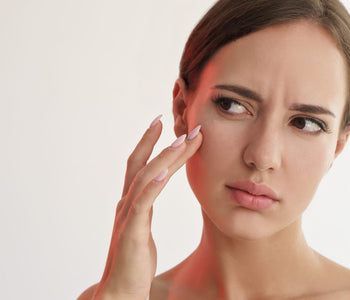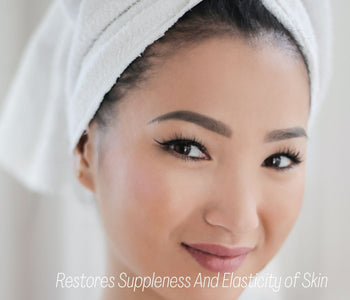Medically reviewed by Minimalist Health Specialist - Written by Nancy Agrahari (Journalist) on 18th Sep 2020
No BS Guide to Vitamin C Serum

Looking for an ingredient that will pamper and get rid of tanned, dull-looking skin, a dose of Vitamin C serum is all that you need. Vitamin C is a powerful antioxidant that penetrates deeper into the dermis for brightening, smoother complexion. It smoothes the texture and visibly vanishes dark spots.
If your diet includes Vit C, but you feel no difference whatsoever into your skin. Our guide will give you an insight into topical Vitamin C and how to use a C serum effectively to reap maximum benefits.
Not all Vitamin C serums are created equally! The concentration of the acid, other ingredients, the stability of the formulation, and the packaging affects the performance of serum to a great extent. But do not worry, we have covered that too!
So, get ready for that dewy, glowy look.
What is Vitamin C?
Vitamin C is a water-soluble Vitamin with many benefits for your body and skin. It is also one of the most researched Vitamins that you can safely apply to your skin. Also known for its ninja powers to protect, restore, and enhance your skin texture.
Ascorbic acid is a pure form of Vitamin C, one of the most popular water-soluble ways of Vitamin C that protects the skin from damaging “free radicals” created by exposure to the environment. This exposure leads to skin aging and sagging of the skin.
Ascorbic acid is usually highly unstable and thus easily oxidize in the presence of light and air. There are other forms of Vitamin C popularly known as Vitamin C derivatives that are less potent than ascorbic acid but much more stable.
Why does Vitamin C serum deserve a place in your daily skincare routine?
Honestly, there is nothing that Vitamin C serum can’t do. It is a proven antioxidant that neutralizes the oxidative stress by the process of electron transfer/donation. Thus, other than delivering a smoother, even complexion, it also acts as armor against environmental and free radical damage.
Even so, we have a balanced diet to fight unwanted harm; they are not enough to keep our skin protected. Also, the skin’s ability to store these Vitamins decreases due to age or photodamage. Thus, the best way to protect your skin and soak the full benefits of Vitamin C is to apply it to your skin directly.
By now, you must already be ready to grab those fresh lemon slices from your refrigerator and put them on your face for that glow. But that might not be the best Idea!
First of all, the quality of lemon depends on a lot of things such as source, harvest, etc. Secondly, it contains very little concentration and may not work effectively. Raw lemon juices can be irritating and cause redness in some cases.
Using Vitamin C in serum form (after it has been chemically altered) sinks deeper into the skin, utterly absorbing its benefits. Regular use of the serum will help to reduce against sun-damage while boosting collagen formation. It also evens skin tone and reduces fine lines and wrinkles.
Vitamin C Serum Benefits
- Brightens Skin
- Evens skin tone
- Suppress melanin formation to reduce hyperpigmentation
- Fights free radicals, reducing oxidative stress
- Protects the skin damage from harsh pollution and UV rays
- Boosts collagen formation for a firm look
- Effectively targets visible signs of aging
All of these benefits are scientifically proven in many clinical trials and human studies. While a Vitamin C serum can do all the above, it is essential to note that the right formulations and application play a significant role.
The next section is dedicated to the right way to apply Vitamin and finding its BFFs to double its power.
When & How to Apply the Vitamin C Serum?
Vitamin C serum up to 20% concentration can be applied twice daily both morning (AM) and night (PM) right after cleansing and hydration or toning.
Take 2-3 drops of Vitamin C serum on your fingertips and gently apply them in your face and neck in circular motions. Allow 1-2 minutes to get it absorbed completely before applying your moisturizer or SPF.
To get full photoprotection, you need to build a reservoir of Vitamin C under your skin. That can be achieved by 8 hourly topical application of Vitamin C as per a study.
But, it is okay if you miss 1-2 applications as it does not wash away like sunscreens or creams. However, exposure to the sun lowers the Vitamin C level in your skin. So, after prolonged sun exposure, you can re-apply Vitamin C serum.
For glowy, firm skin follow a skincare routine that typically includes cleaning, hydrating, followed by serums, creams, or moisturizers. During the day or office hours, apply Vitamin C serum with sunscreen with SPF 30 or more followed by a moisturizer.
Although Vitamin C protects you from UV radiation damage, it does not stop UV rays from penetrating your skin. In short, it is not sunscreen. For maximum protection from pollution and UV rays, pair this serum with a sunscreen with SPF 30 or more.
BFFs of Vitamin C serum
Hyaluronic acid prepares the base for other water-based serums and thereby boosting their absorption. Apply Hyaluronic acid serum (not cream-based moisturizers) before Vitamin C serums as hydrated skin quickly absorbs Vitamin C compared to dry skin. Hyaluronic Acid doubles the power of Vitamin C by increasing its absorption deep into the dermis layer. Apply 2% Hyaluronic acid serum before Vitamin C serum for a plump, radiant skin
Ferulic Acid is another powerful antioxidant that usually supports primary antioxidants such as Vitamin C and enhances their performance. Ferulic acid is usually added into serum only, so look for it in the ingredient list of Vitamin C serum.
Vitamin E and Vitamin C duo give a tough fight to free radicals and photodamage. The combo is proven to reduce the sun damage better than when used alone. You can either include two separate Vit E oil and Vit C serum or look for a formulation that contains both. Since Vitamin E is fat-soluble, you might not find many formulations that offer both. Also, Vitamin E oil is heavy oil, so oily skin people shall either use it as a spot treatment or skip altogether.
Does not go along
Vitamin C usually does not interact with other serums and goes well with face acids and serums with a similar pH. Many blogs and even popular sites say Vitamin C and Niacinamide does not go along.
It is based on an old 1963 study, and newer studies have shown they are not only safe to be used together but also beneficial for even baby-soft skin. Also, the previous research was done with L-ascorbic acid, which is highly unstable.
Minimalist Expert’s Advice:
If Niacinamide is formulated at pH between 4.5 -5.5, such as at Minimalist Niacinamide serum, combining it with Vitamin C serum will not affect its integrity. In fact, combining them will give you clear skin blemish-free skin with full protection from photodamage.
However, keep a 15-20 minute gap when applied together and always apply slightly lower pH serum i.e., Vitamin C first for maximum results.
Now you know what Vitamin C serum can do for your skin and how to use it effectively, you must be planning to get one for you right away!
But before you get all pumped for buying your first Vitamin C serum, go through this next section written to ensure you get the best formulation. To choose the best, you need to know what to look for in a Vitamin C serum.
Not All Vitamin C Serums are made Equal!
Many brands offer Vitamin C serum, but half of the time falls short of expectations. It is usually because they either have less or more concentration of the acid, unnecessary ingredients, or unstable formulation that easily goes bad.
The effectiveness of Vitamin C serum majorly depends upon the concentration and stable formulation. If a serum delivers between 8-20 % of stable Vitamin C, then it provides maximum effectiveness.
20% is the magical concentration at which maximum absorption happens. Greater than 20% will lie on the surface of your skin and irritate. Vitamin C 20% makes a massive difference in terms of pigmentation. It acts on the melanin formation process and thus slows down pigment production, vanishing the dark spots.
Though it sounds pretty obvious, look at the ingredient list for words like Sodium Ascorbyl Phosphate (SAP) or L-ascorbic acid. These ingredients should be close to the top of the list (when concentration is not declared)
Preferably choose the formula that declares concentration in black and white.
L-ascorbic acid is the purest form of Vitamin C but highly unstable. Although it is more potent than other Vitamin C derivatives, it is less effective when applied topically as it is easily oxidized.
An equivalent Vitamin C derivative such as Sodium Ascorbyl Phosphate (SAP) or Magnesium Ascorbyl Phosphate (MAP) delivers much more direct Vitamin C available at inner layers of skin. Studies show that SAP with a pH level below 3.5 enters deep into the skin.
A potent Vitamin C serum has
- Stable Vitamin C Derivatives (SAP or MAP)
- pH between 3.5 to 4.5
- Additional Ingredients such as Ferulic acid or Vitamin E
- Airtight packaging with frosted glass
- Dark-tinted glass packaging
All of this and more is found in Minimalist Vitamin C 20% serum. It is so popular because of its unwavering results. Minimalist 20% Vitamin C serum is formulated at pH 3.5 for maximum absorption and paired with Ferulic acid's unique properties that double photoprotection.
How is Minimalist Vitamin C 20% serum different?
A unique formulation with pure aloe juice instead of 70-80% water/aqua present in other serums to give a smooth non-sticky consistency. Its feather-light texture sinks deeper into the dermis, thus ensuring delivery of maximum concentration of pure Vitamin C to reduce spots and pigmentation.
This serum is formulated with a stable 20% concentration of Sodium Ascorbyl Phosphate (SAP) (Vitamin C derivative) by BASF, Germany, ranked 12th in the Top 50 most innovative companies by BCG.
Sodium Ascorbyl Phosphate by BASF is water, oxygen, and light stable, making it easier to layer it with other products. It is paired with Ferulic acid for maximum antioxidant dosage for your skin.
Negative ingredients or fragrances tend to create redness or irritation after years of use. When used every day for an extended period, a small percentage of such fragrances might put off our skin and irritate.
This serum has no odor or fragrance, thus solidifying its purpose to create brighter, even tone not just now but also in the future.
Is Vitamin C good for acne treatment?
The top advantage of using Vitamin C serum is that it suits every skin type. It has anti-inflammatory and anti-microbial properties that fight acne and reduces dark spots. Regular use of this serum reduces acne scars and pigmentation.
Although it helps with inflammation and acne scars, it is not an acne treatment for persistent acne. We suggest trying it in combo with Benzoyl peroxide and 2% Retinol. You can read our routine for acne-prone skin for more details.
Future Side Effects and Risk
Usually, topical Vit C is largely safe to use daily, all skincare products have the potential to cause side effects. Using concentration above 20% may lead to irritation, redness, or yellowish discolorations. In some instances, there can be dryness, which can be treated by applying moisturizer.
Though a higher percentage of serums can be too strong for the skin, the best way to avoid purging or breakout is by using serums with a stable concentration of SAP or Vitamin C.
Using Minimalist Vit C serums, with its 20% organic concentration, there are close to no chances of side effects. Its soothing formula does not clog your pores hence no breakout or purging.
Like any other skincare product, you should always do a patch test to access any potential side effects or allergic reactions. For patch test:
- Select an area like your forearm or wrist.
- Apply a small amount of the product and wait for 12-24 hours.
- If there are no side-effects, then you are good to use it on your face. In case of any irritation, redness, discontinue using the product.
The benefits of Vit C depend upon its packaging too. Vit C is unstable, and exposure to light makes it bad.
How would you know your Vitamin C serum has gone bad?
If the product has darkened or otherwise changed color to dark yellow or orange, then Vit C has oxidized. Although the product can still be used, it won’t have any benefits. Minimalist Vit C serum contains a stable derivative of Vitamin C, SAP by BASF, and it is 100% effective as it does not oxidize. So, you can easily use it months after opening the bottle. It comes in a frosted glass bottle.
The Takeaways
Vitamin C or ascorbic acid is water-soluble, which means our body can’t store it. The food supplements get divided into tissues and other parts, thus leaving less for the skin. So, our skin needs a regular supply of topical Vitamin C to build its reservoir.
Topical Vitamin C serums are safe and will boost collagen formation, target the signs of aging, giving your skin the much-needed glow when applied as a daily serum.
Whatever product you choose, look for the ones that will benefit your skin in the long run. You don’t need fancy products for your skin, just effective Minimalist ones.





